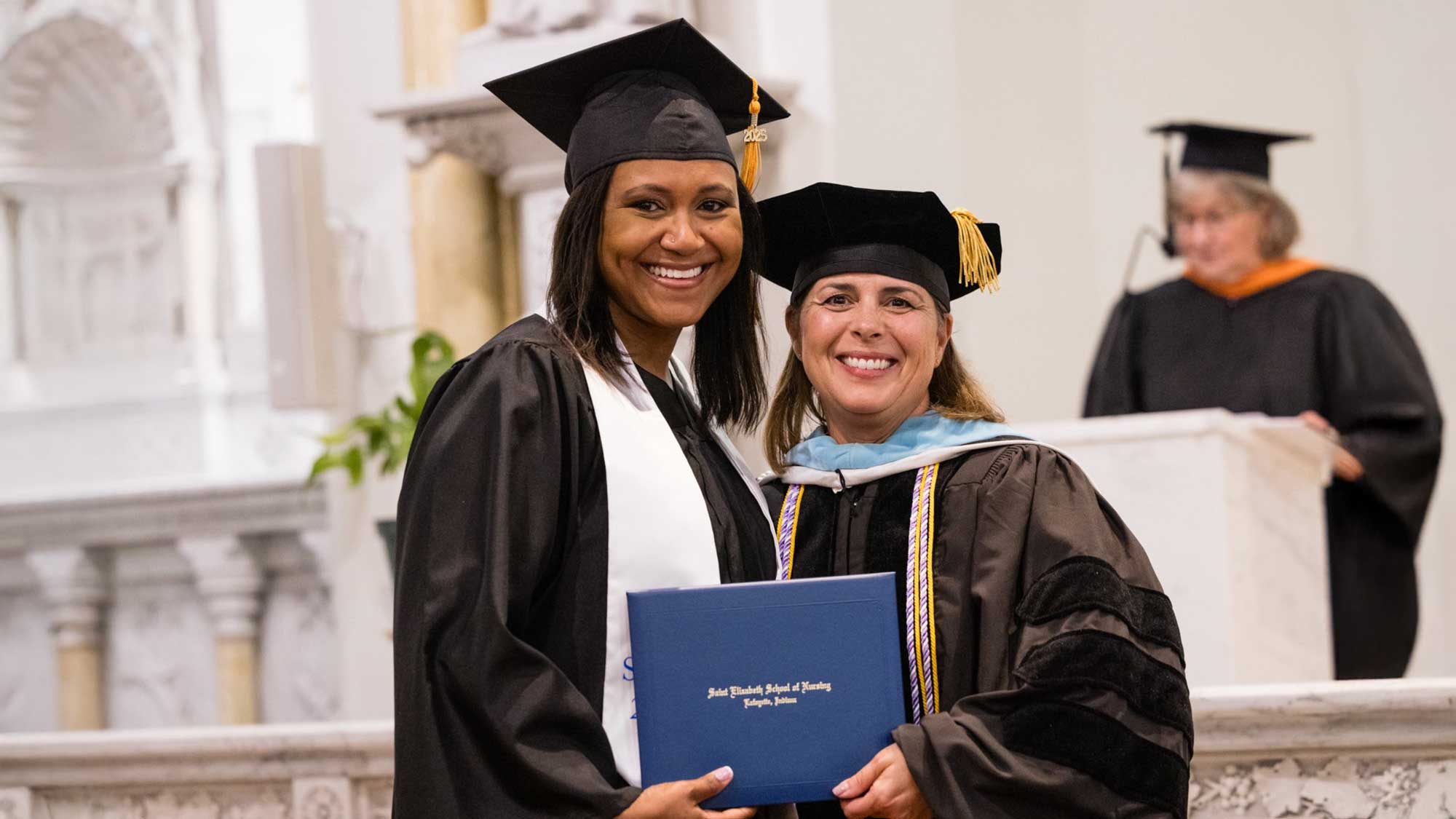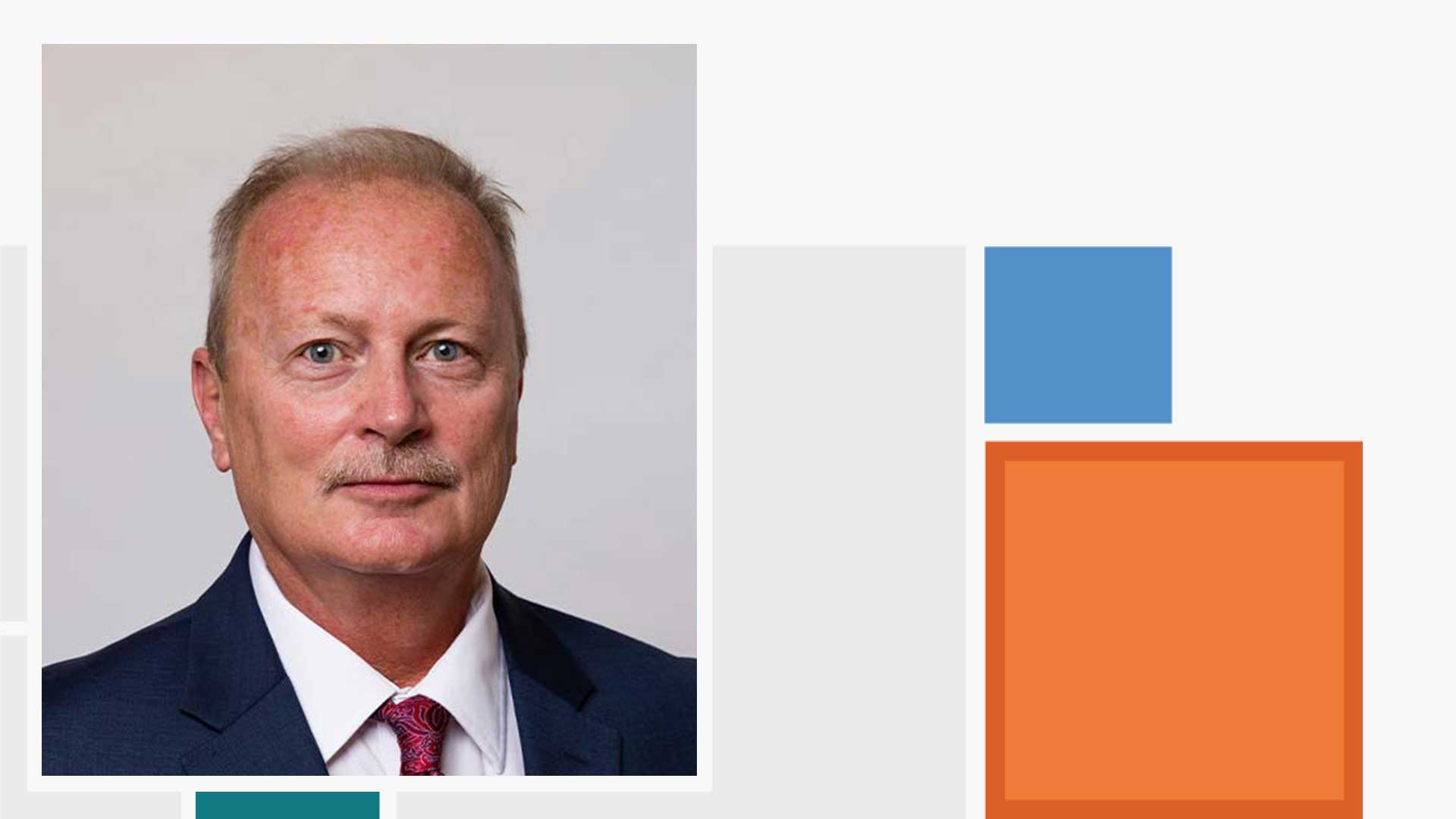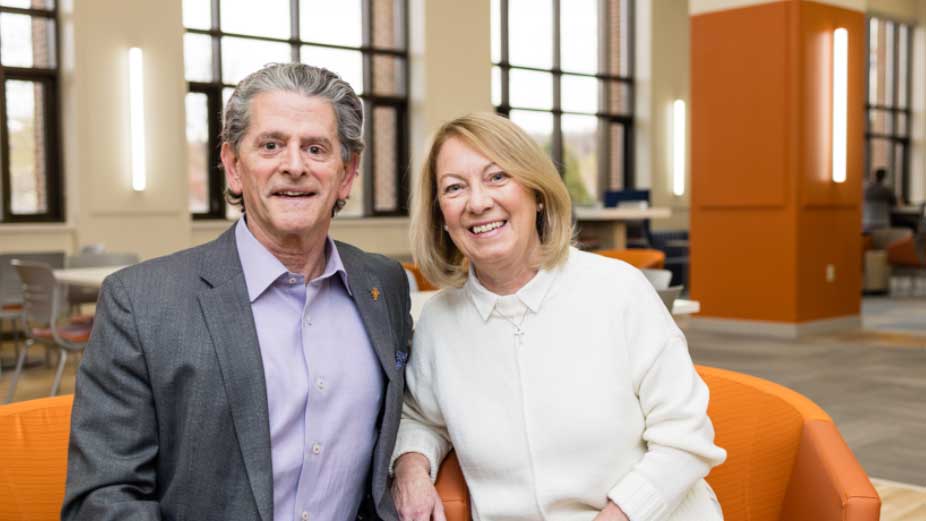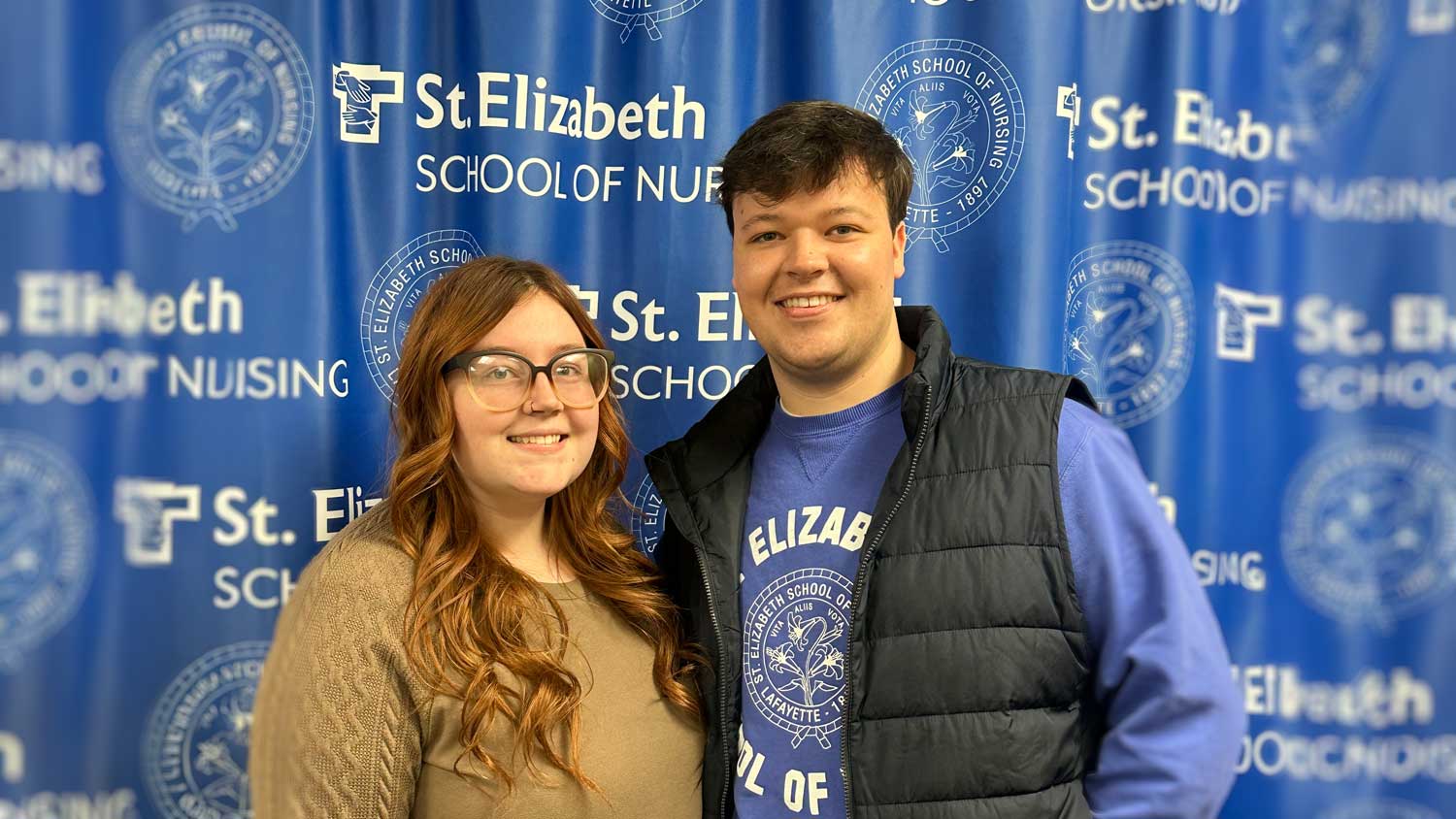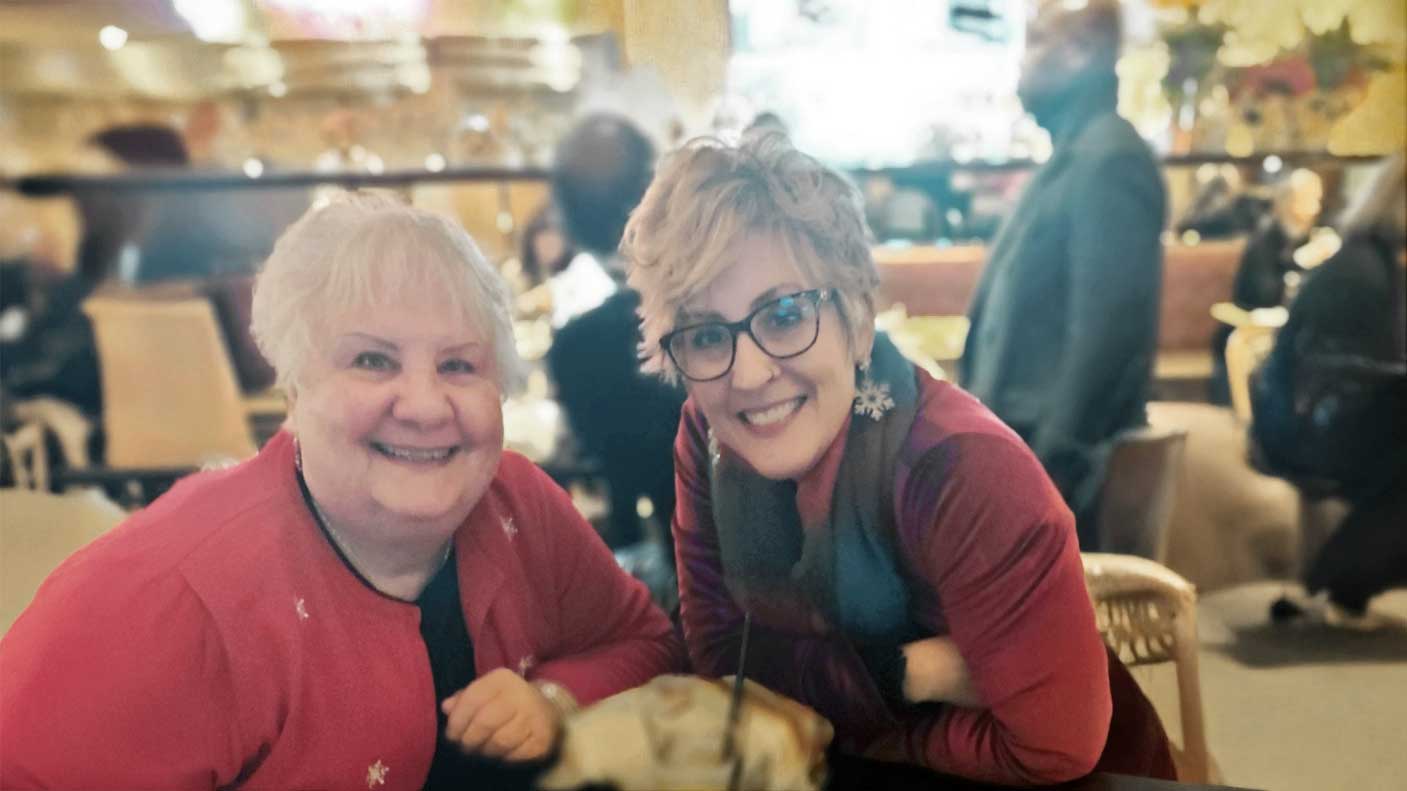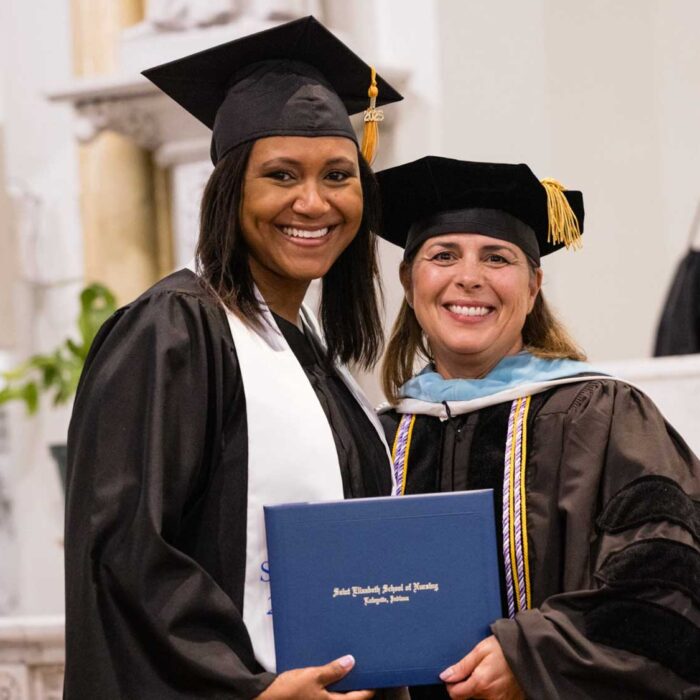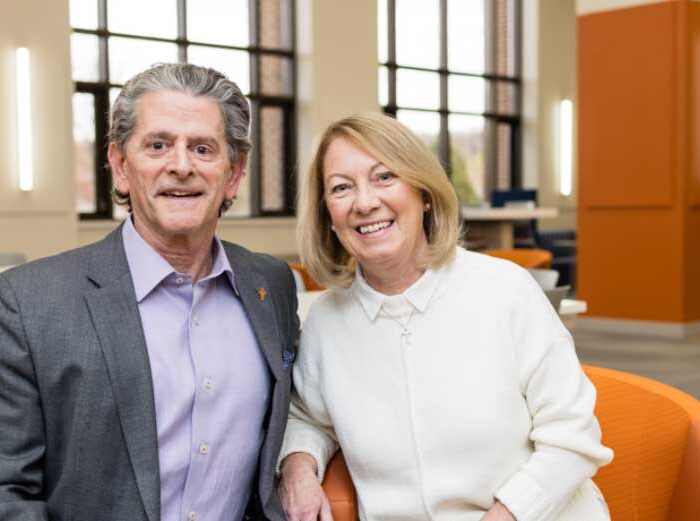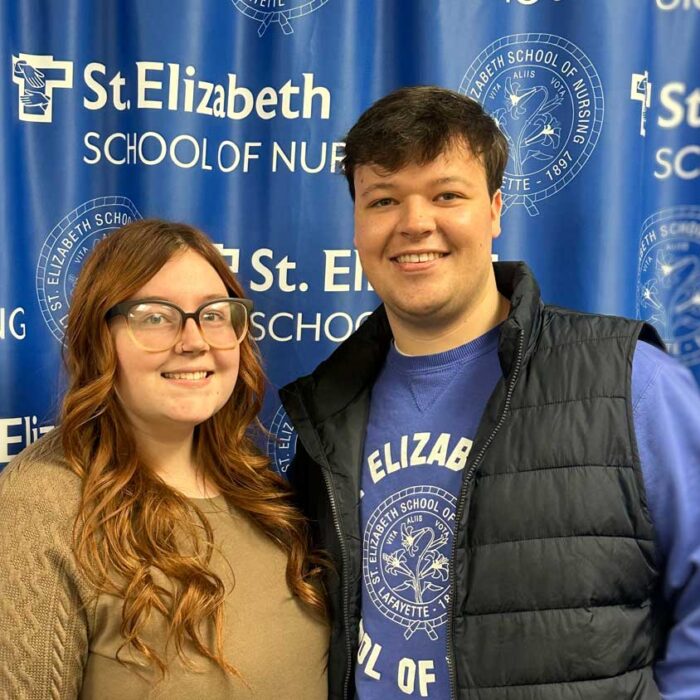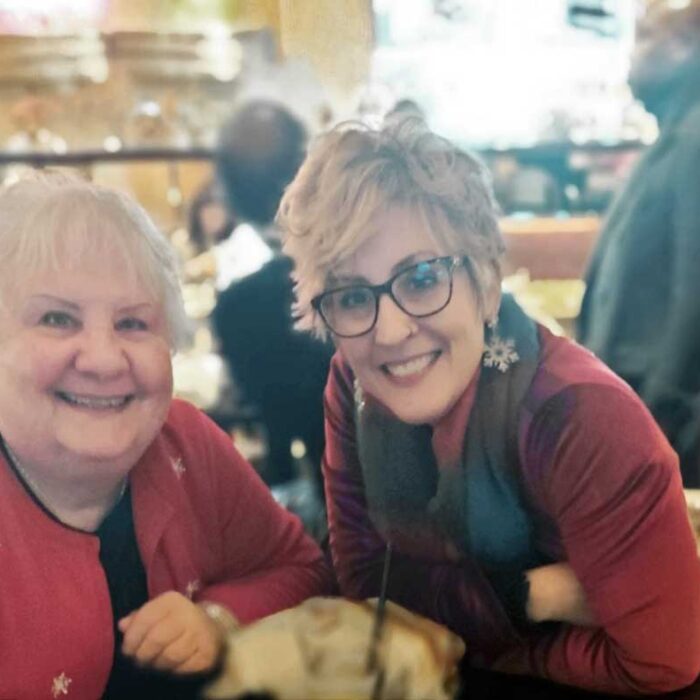St. Elizabeth School of Nursing’s alumni and friends have unique stories capturing the historical moment when COVID-19 arrived. This collective snapshot of their resiliency, grit, and spirit represents the more prominent portrait of all who have graced our campus as fearless educators, backbone support staff and beloved students past and present.
Our Students
St. Elizabeth’s students, whether fresh-faced or on the cusp of graduating, devote themselves to becoming the hands and feet of Christ. Hours of hands-on experiences. Late-night study groups. Juggling life’s demands and school requirements. These facets of their life become routine. Until the unexpected happens: a global pandemic.
Tina Tanselle’s May graduation date was on the horizon. Always the planner, which she credits to the organizational skills gleaned at St. Elizabeth, Tanselle completed her required clinical hours weeks before their due date—before the threat of COVID touched Indiana’s borders. “I was one of the lucky ones,” Tanselle shared. “I had planned it that way—to be done early with my clinical hours—not knowing what was about to happen.” Her foresight was a blessing in disguise as intensity ramped up for classmates who needed to complete their hours. Faculty quickly reached out to hospital contacts, ensuring students had a place to complete their work.

While preparing for graduation, Tanselle found solace spending time outside away from stressors and uncertainty. Early morning runs provided comfort and allowed her to work through some disappointments. Her long-planned celebratory vacation was canceled, as was the pomp and circumstance of the graduation she had envisioned. Still, Tanselle knew to look for the bright spots in dark times. “I’ve loved seeing the goodness in people and watching communities come together to help one another,” she shared.
As a nation, we witnessed it too. Meals delivered to emergency rooms. Evening cheers of adoration echoed across cities. Small offerings of gratitude that deeply touched front line workers.
Michelle Lipscomb, another newly minted May 2020 graduate, tutored students rising through the ranks of St. Elizabeth. As campus emptied, Lipscomb struggled with being less accessible to her mentees. “Before, I could pop into a study room the minute they asked, ‘Hey, could you please help me with this?’ because we were all on campus, together.” She continued reaching out to those she tutored while dealing with her own challenges: completing clinical hours, studying for the National Council of Licensure Examination (NCLEX) and helping her children shift to online learning. Lipscomb’s concern mirrored the faculty’s. They also yearned to effectively communicate their availability and meet student needs, no matter what they may be.
Waiving some of the necessary licensure requirements and adding a grace period to complete the NCLEX, senior nursing students across the United States were actively recruited to help fight the pandemic.
Lipscomb’s future patients will be blessed by a caregiver armed with personal and professional decision-making skills. Referencing how St. Elizabeth gave her the tools to evaluate situations as a professional, she confidently stated that after completing her licensure examination, “I’ll hit the ground running, ready to serve.”

Our Staff and Faculty
The ordinarily active campus of St. Elizabeth became unrecognizable. Once bustling halls were eerily quiet. The classrooms were empty. The busy SIM Lab laid dormant except for one person: Lauria Lanke. Lanke coordinates and programs medical manikin simulations. Working with instructors, she creates limitless patient scenarios, ranging from detecting irregular bowel sounds to administering medication. For future RNs, this lab is the place for actively learning the ins and outs of intake, diagnosis and patient care.
When St. Elizabeth shuttered on-campus learning, faculty partnered with Lanke. Together, they devised new learning techniques. “Rather than students engaging in simulations, it was professors who stepped into the spotlight,” she recalled. The skilled technician, who typically voices the patient or doctor in the control booth, rapidly helped faculty carve out a new instructional path to keep student learning on track. Patient scenarios were recorded, then students watched and reported back to instructors. Creativity abounded as faculty injected humor into lessons and relieved the pressures of the new climate. “The faculty created personas like ‘Nurse Nancy.’ They donned wigs, created accents and injected silly little things into learning,” Lanke shared. Genuine content mastery was of the utmost importance to all staff.
“Our students are not just another piece of paper to instructors. We want them to perform well as nurses and in life, and not just in times of crisis-always.”
– Lauria Lanke
Some students were already well-versed in online coursework. For others, the curve to adapt was more significant. Abbi Peña, the principal course instructor for pharmacology and pathophysiology, stressed that students were not left to their own devices. Virtual meeting platforms, debriefs after learning activities and one-on-one meetings quickly transpired from something fearful to something welcomed. “In the beginning, we sensed students’ anxiety not having the same resources as they did in the classroom or during clinicals.” Peña noted a sense of ease replaced trepidation. As the days and weeks progressed, students learned to enjoy remote learning and meetings. “Rather than set appointments on campus, we met virtually at the student’s convenience,” something Peña plans to continue in the future.
Peña added that the flexibility and adaptability of completing coursework while striving to find a sense of normalcy during the pandemic parallels real life as a nurse.
“RNs have to remain adaptable. Perhaps adjusting rapidly to new ways of learning showed students just how quickly things change in nursing.“
– Abbi Pena

When your holistic curriculum is entrenched in active learning and participation, thinking outside the box is a must. Stacie Klingler, an assistant professor whose specialty is pediatrics and NICU nursing, flipped the learning process. “I collected my daughter’s baby doll, some supplies and created learning scenarios.” Klingler’s student nurses, via GoToMeeting, directed her every move. “We could no longer do clinicals the way we always had. I considered what I wanted to communicate to my students and what they truly needed to know.” Student feedback was positive. “It’s a challenge to teach skills and concepts without them being physically there, and yet, the students liked it and did well.”
The early days of the HIV/AIDS epidemic is the closest comparison Klingler can name looking at what we face today. The isolation COVID patients feel as some draw their last breath reminds Klingler of her time as a student nurse comforting dying AIDS patients. “Everyone deserves dignity, especially in their last moments on earth,” she professed. Another core belief proudly embedded into St. Elizabeth’s nursing program.

Pride swells when faculty discuss former students on the front lines. Jean Catron, who instructs pathophysiology, pharmacology and medical-surgical classes, beams at the thought. Like other St. Elizabeth instructors who keep in touch with alumni via email and social media, Catron has reached out to former students, balancing her wonderment in their fortitude with concern for their safety. Her devotion is evident. “There comes a point where students start to feel like your children,” she mused, and it’s understandable given the time invested in each person who walks through these doors.
St. Elizabeth constructs confidence-building opportunities for students within their curriculum. This natural curiosity to learn and improve molds students into individuals who want to be their best—always. On an average day, providing above board care and nurturing a patient’s body, mind and soul can be stressful. Catron emphasized that COVID-19 introduced another facet healthcare must address: caring for their own mental health. “When this crisis is over, I hope mental health resources will be available for all healthcare professionals. They deserve access to help at all times. Not just during a pandemic.”

Our Alumni
St. Elizabeth is proud of its alumni who serve in various capacities around the world—on the front lines, spearheading initiatives and leading departments. No matter their role, they jump into the fray, lend a hand and care for one another in moments of distress, fatigue and illness.
COVID-19 brought significant and immediate change to the world of healthcare overnight. This statement is far from hyperbole when you hear alumni recount the very moment everything changed before their eyes. Jody Mathew, Director of Operations at Franciscan Health Lafayette East and a 1978 St. Elizabeth graduate, recalled the early days of sorting through shifting information to keep staff informed and—most importantly—to remain ready no matter what. “Our timeline to prepare was short,” Mathew said, reflecting on the hours and days of readying the hospital. That included planning for looming unknowns, such as running out of ventilators, making end-of-life decisions, providing emergent staff housing and arranging childcare options.
“We worked tirelessly to provide answers, be ready, and support our staff, some of whom were frightened and uneasy. What they needed was not a chain of emails coming from the office. They needed a shoulder to cry on and someone checking in as they checked on their patients.”
– Jody Mathew
Medical teams carried concern for another reason as well. Stories dotted the country, noting people refraining from seeking medical treatment for issues unrelated to COVID. Most commonly heard were fears of contracting the virus along with worries of taking precious space from someone who needed it more. “We had to postpone elective surgeries, yet some cases required immediate interventions. If patients came to the hospital due to illness other than COVID, we knew they felt compelled to risk infection to come,” Mathew shared.

Hospitals are not the only institutions where patients seek treatment daily. A 2017 graduate, Emily Weesner Clark is now an infection control nurse at a southern Indiana prison. Inmate lockdown was instituted to keep COVID from infiltrating the staff and those incarcerated. Clark became a traveling nurse, visiting patients in their cells. Her concerns centered around not only the virus spreading but also inmate aggression due to their restricted mobility. Clark credits her alma mater for building her confidence in handling daily stressors, responsibilities and times of crisis. “St. Elizabeth prepared me to be confident in my medical training and leadership skills.” Clark knows the school’s emphasis on community and working together led her to embrace collaboration. “I’m blown away by the teamwork that’s blossomed during the crisis at the prison. We had to get creative and work together.”
This pandemic has affected every area of healthcare operation, reconfiguring personnel, policies and roles. Rather than turning away from needs that arose, coworkers stepped up and stepped in. Debbie Riley, Director of Patient Care Services for Franciscan Health in Rensselaer and a class of 1980 alumnae, saw the ethic of working together swell in real-time. Staff assisted Environmental Services to keep areas safe and clean. Screeners covered every hospital entrance while drive-thru testing services dispersed teams into the field. Together, they made it work, and the camaraderie continues. “Even as our volume of patients slowly returns to more normal numbers, staff are figuring out how they can continue performing extra duties to help one another in our everyday work,” Riley said.

Riley, along with the other students, staff and alumni who kindly lent their time to this article, emphasized the need for all of us to extend grace to ourselves and one another. Mercy and compassion are at the core of nursing. And in this year of the nurse—celebrating the life of Florence Nightingale and the contributions of nurses through the years—we recognize the grace required to make peace with a hard day at work. Nurses wake up and do it all over again while caring for their families, patients and healthcare counterparts. Debbie Riley eloquently sums it up best:
“Nurses are superheroes, and even superheroes need support from others.”
– Debbie Riley
As seen in the The Lamp fall 2020 issue

